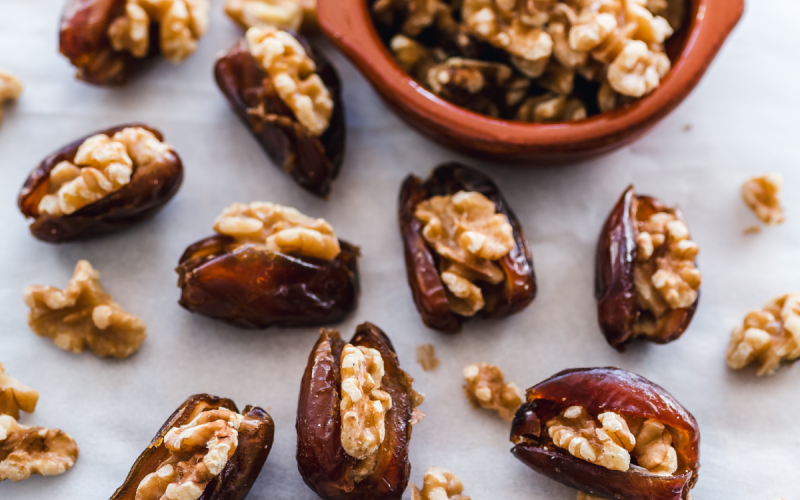Dates are the fruit of the date palm tree, which is grown in many tropical regions of the world. Dates have become quite popular in recent years.
Almost all dates sold in Western countries are dried.
You can tell whether or not dates are dried based on their appearance. A wrinkled skin indicates they are dried, whereas a smooth skin indicates freshness.
Nutritious
Dates have excellent nutritional properties.
Since they’re dried, their calorie content is higher than most fresh fruit. The calorie content of dates is similar to that of other dried fruits, such as raisins and figs.
Most of the calories in dates come from carbs. The rest are from a very small amount of protein.
A 3.5-ounce (100-gram) serving provides the following nutrients:
Calories: 277
Carbs: 75 grams
Fiber: 7 grams
Protein: 2 grams
Potassium: 20% of the RDI
Magnesium: 14% of the RDI
Copper: 18% of the RDI
Manganese: 15% of the RDI
Iron: 5% of the RDI
Vitamin B6: 12% of the RDI
Dates are also high in antioxidants, which may contribute to many of their health benefits
Dates contain several vitamins and minerals, in addition to fiber and antioxidants. However, they are high in calories since they are a dried fruit.
High in Fiber
Getting enough fiber is important for your overall health.
With almost 7 grams of fiber in a 3.5-ounce serving, including dates in your diet is a great way to increase your fiber intake .
Fiber can benefit your digestive health by preventing constipation. It promotes regular bowel movements by contributing to the formation of stool (3
For this reason, dates have a low glycemic index (GI), which measures how quickly your blood sugar rises after eating a certain food.
summary
Dates are high in fiber, which may be beneficial for preventing constipation and controlling blood sugar control.
High in Disease-Fighting Antioxidants
Dates provide various antioxidants that have a number of health benefits to offer, including a reduced risk of several diseases that we are going to explain
Antioxidants protect your cells from free radicals, which are unstable molecules that may cause harmful reactions in your body and lead to disease
Compared to similar types of fruit, such as figs and dried plums, dates appear to have the highest antioxidant content
Here’s an overview of the three most potent antioxidants in dates:
Flavonoids: Flavonoids are powerful antioxidants that may help reduce inflammation and have been studied for their potential to reduce the risk of diabetes, Alzheimer’s disease and certain types of cancer
Carotenoids: Carotenoids are proven to promote heart health and may also reduce the risk of eye-related disorders, such as macular degeneration
Phenolic acid: Known for its anti-inflammatory properties, phenolic acid may help lower the risk of cancer and heart disease
May Promote Brain Health
Eating dates may help improve brain function.
Laboratory studies have found dates to be helpful for lowering inflammatory markers, such as interleukin 6 (IL-6), in the brain. High levels of IL-6 are associated with a higher risk of neurodegenerative diseases like Alzheimer’s
Additionally, animal studies have shown dates to be helpful for reducing the activity of amyloid beta proteins, which can form plaques in the brain
When plaques accumulate in the brain, they may disturb communication between brain cells, which can ultimately lead to brain cell death and Alzheimer’s disease
One animal study found that mice fed food mixed with dates had significantly better memory and learning ability, as well as less anxiety-related behaviors, compared to those that did not eat them
The potential brain-boosting properties of dates have been attributed to their content of antioxidants known to reduce inflammation, including flavonoids
However, human studies are needed to confirm the role of dates in brain health.
to read the second part of this article click here
Resource:https://www.healthline.com/nutrition/benefits-of-dates

